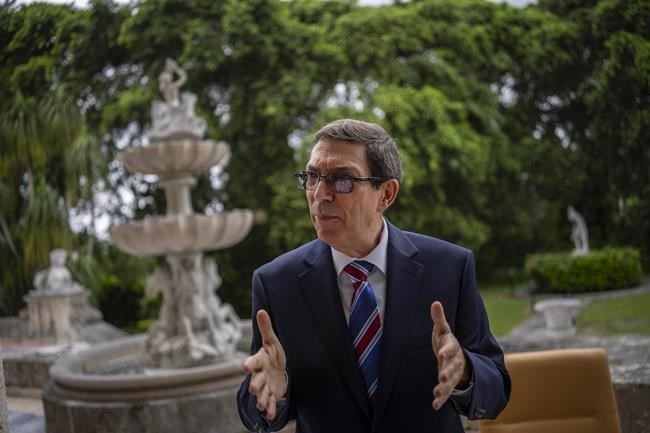
Cuba's Foreign Minister Bruno Rodriguez speaks during an interview with The Associated Press in Havana, Cuba, Wednesday, Nov. 17, 2021. (AP Photo/Ramon Espinosa)
Republished November 17, 2021 - 7:27 PM
Original Publication Date November 17, 2021 - 6:51 PM
HAVANA (AP) — Cuba's top diplomat said Wednesday that the fizzled attempt by young activists to encourage anti-government protests this week was a failure in political communication by the organizers, who he again accused of being supported by U.S. interests.
Foreign Minister Bruno Rodríguez spoke two days after no Cubans turned out for demonstrations and a few hours after it was revealed that one of the main organizers, playwright Yunior García, had gone to Spain.
“It is clear that what I called a failed operation — a political communication operation organized and financed by the United States government with millionaire funds and the use of internal agents — was an absolute failure,” Rodríguez said in an interview with The Associated Press.
Organizers on Monday complained that they had been kept from leaving their homes by supporters of Cuba's Communist government or by threats from police to be arrested if they took to the streets.
The foreign minister argued that the activists aren't representative of most Cubans and called on the U.S. government to loosen restrictions on visiting the island.
"I wish they would allow Americans their freedom to travel and that they could come to Cuba and see the reality first hand and discover the deception to which they are frequently subjected, with the aim of sustaining an obsolete, genocidal policy that violates human rights and international law and causes suffering among the Cuban people,” he said.
Rodríguez also questioned the attention given to the call for protests, saying it seems "that Cuba is the only country in the world in which a protest that did not happen becomes international news.”
The organizers had been hoping to repeat the outpouring of anti-government sentiment in mid-July, when thousands took to the streets in cities across the island to protest shortages of goods and power blackouts. Some even called for a change in government.
García and the Archipelago group, which is an online platform of young activists, sought to hold demonstrations to demand the release of prisoners, especially those arrested during the July unrest, human rights and a national dialogue.
Rodriguez repeated the Cuban government's contention that United States was the real force behind the protest effort. He said that of the thousands of Twitter participants and “users” involved in promoting the protests, “less than 2%” were actually in Cuba.
In a statement Tuesday, Archipelago blamed the failure of the protests on government coercion. It said there were “more than 100 activists under sit-down, arbitrary detentions, enforced disappearances, acts of repudiation, violence, threats, coercion and hate speech.”
After the group reported it had been unable to contact García, the playwright on Wednesday reported on his Facebook account that he had left Cuba and was in Spain with his wife, Dayana Prieto. García called the trip an “odyssey” and said the couple were in good health and with “intact ideas.”
The foreign minister said Cuba's government had no involvement in García's departure.
"I guess he is exercising the right that any Cuban has to travel and move freely. There is no martyr capacity in those who organize this kind of farce and failed operations under instructions and funding from the U.S. government,” Rodríguez said.
He also complained about U.S. economic sanctions and said U.S. President Joe Biden hasn't done anything to reverse the tough policies that were taken by President Donald Trump against Cuba.
“The daily reality of the Cubans, of every Cuban family, continues to be difficult, living under the burden of the blockade measures, in particular the measures of President Trump during the pandemic," Rodríguez said.
He said Biden is pursuing “with equal rigor” the same policies, and he said the damage in Cuba from U.S. economic strictures have been intensified by coronavirus pandemic.
The Biden administration has spoken repeatedly in support of the Cuban activists and praised the anti-government protests. In July, the U.S. announced new sanctions on Cuba’s national revolutionary police and its top two officials while seeking to ramp up pressure on the island's government.
News from © The Associated Press, 2021